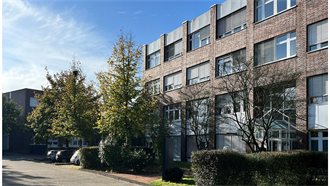The topsy-turvy nature of real estate markets in recent years has been perfectly demonstrated in just a few days in the windy yet sunny south of France.
BY ROBIN MARRIOTT
‘Hello Roger. How’s business?’
It is Wednesday afternoon at the entrance to the Majestic Hotel and Mipim is in full swing.
To paraphrase his answer: ‘Urgg, it would be better without this banking mess.’
‘SVB you mean?’
‘Well yeah and the others. I think this is gonna cause problems.’
‘Like, you needed something else to come along on top of everything else, right?’
‘Exactly.’
The brief exchange was unsettling.
When the first thing out of the mouth of a seasoned real estate professional is something about a banking threat, it is not to be taken lightly, especially when that person has seen all the cycles in the last few decades and is from a major US alternatives asset manager steeped in credit, PE and real estate.
It is true that at Mipim, the collapse of Silicon Valley Bank was being discussed on the opening day, Tuesday, but that issue seemed a little remote to many.
On Wednesday, however, Credit Suisse was in the news after its shares crashed 30% following an answer given by its biggest shareholder, Saudi National Bank, to a simple question by a reporter: ‘Would you buy more shares in Credit Suisse?’ Answer: ‘No.’
But could even our seasoned real estate professional have predicted that by the weekend, just a few days after the end of Mipim, Credit Suisse would be sold to UBS in an attempt to stave off a wider systemic banking crisis? And yet, on Sunday, this is what was announced.
While the talk of a possible black swan event was limited to just SVB, Signature, and First Republic bank, it seemed possible to pass these off as a storm in a teacup.
Delegates had understood, firstly, that SVB was about tech companies, so that’s ok. [But it later turned out that, actually, the risk from these US bank failures was more significant than managers first thought as it seemed some real estate firms had exposure.]
Secondly, the common stance was actually a positive one. To paraphrase, the real problem for property investors has been interest rates going up too fast. With the recent bank failures, surely central banks will not have the appetite to raise interest rates with such gusto.
The downside is that banks will become even more conservative – that’s bad. But then again, that will play into the hands of alternative lenders. With many investment managers having debt funds, this could be quite good.
One can see the logic. The only problem is that it seemed disproved by Thursday when Christine Lagarde, president of the European Central Bank, held a press conference to explain why the ECB just decided to put interest rates up by another 50 basis points.
This surely cannot have helped the mood among real estate investors as the curtain started to come down at Mipim. It led to a mismatch because the mood on a social level was really high but storm clouds seemed to be rolling in.
As Sander van de Rijdt, co-founder and co-CEO of PlanRadar, said: ‘Mipim is back to its old greatness, the halls were full and there was a positive networking climate. Yet the mood was marked by great uncertainty. Above all, the interest rate hike, high inflation and the latest problems from the ranks of the banks are causing uncertainty in the industry.’
‘As a result, the further development of interest rates, the outlook for the current business year and the possibility of an emerging banking crisis were the most discussed topics at the fair. As always, some market participants simply do not want to acknowledge the changed framework conditions and necessary adjustments, others are already active, realising that change also brings opportunities.'
Many conversations were quite uniform among agents and investment managers. It seems that people are not desperately busy on transactions. They would much prefer the rush of deals flying around left, right and centre, and the adrenaline that brings with it.
Instead, the majority view is that the European investment market is in for a quiet H1, with hopes that H2 will be busier.
Price discovery is not quite there yet. Whilst some say there is an uptick in agents pitching for sales mandates, it is not really a racy market.
One person said the pitches occurring were typically for assets that need to be sold because of refinancing issues or where it was time to get rid of a last asset in a portfolio.
Another said transactions were being talked about regarding operators looking to team up with fresh capital providers.
The other frequently expressed opinion was that the UK had repriced quicker than in Continental Europe, which was also the case after the GFC of 2008. In other words, ‘Europe is a little behind the UK.’
One CEO of a major global RE investor has a theory that this could be partly to do with the way UK agents can behave and how UK valuers can value assets in slightly different ways, leading to clearing prices being reached more quickly.
Naturally, there are nuances depending on which asset class is being spoken of. In just one example, yields moved out faster in UK logistics and are now looking interesting again. Office, retail, and living assets have their own dynamics.
But the main theme remained. David Tschörner, MD at Red Square, said: ‘Mipim confirmed our own deliberations on current trends: the market has moved away from being a seller's market. The time of quick and successful transactions is over for the time being. In the future, the focus will lie on the quality and redevelopment of real estate.'
Sven Sontowski, MD, Sontowski & Partner, said; ‘Little has changed since Expo Real (in October 2022). The industry is still in a waiting position. For developments, I am of the opinion that if the quality and sustainability are right, a good product will find its buyer at the right time, we just have to roll up our sleeves and work in partnership.’
Marius Schöner, head of EMEA residential operator division, CBRE Investment Management, added: ‘At this year’s Mipim, new realities began to manifest: interest rates are back permanently and we will not return to the old price levels in the foreseeable future.’
‘Those who have to refinance in the short term are feeling increasing pressure to act and the belief that there is still enough time to get the house in order is visibly fading. It is irritating when a project does not yield any or sufficient profit, but it is worse to have no liquidity. Cash is king.’
‘The steep rise in interest rates has led to a need to rethink and reassess financing even for moderately financed projects. This also means that buyers are in the driver's seat as there is no real pressure to spend on real estate, especially seeing that alternative investments have become more attractive.’
Christian Vogrincic, founder and board member, CV Real Estate, said: ‘The discussions at Mipim reinforced the impression that the real estate industry is facing a turning point. Following the sharp rise in interest rates, real estate is now only one asset class among many for institutional investors. For office properties, rents are going up and factors are going down, the residential market is dead – and in general, if you don't have to sell, you're not selling at the moment.’
*See the next issue of PropertyEU for full coverage of Mipim 2023



































